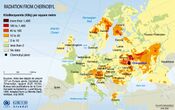Template:Are You Sure/April 26: Difference between revisions
No edit summary |
No edit summary |
||
| Line 3: | Line 3: | ||
• ... that the '''[[Chernobyl disaster (nonfiction)|Chernobyl disaster]]''' began on Saturday 26 April 1986 with an uncontrolled nuclear chain reaction caused by a combination of unstable conditions and reactor design flaws, and that the chain reaction rapidly released of a large amount of energy which vaporized superheated cooling water, ruptured the reactor core in a highly destructive steam explosion, and ignited an open-air reactor core fire, and that airborne radioactive contaminated parts of the USSR and western Europe? | • ... that the '''[[Chernobyl disaster (nonfiction)|Chernobyl disaster]]''' began on Saturday 26 April 1986 with an uncontrolled nuclear chain reaction caused by a combination of unstable conditions and reactor design flaws, and that the chain reaction rapidly released of a large amount of energy which vaporized superheated cooling water, ruptured the reactor core in a highly destructive steam explosion, and ignited an open-air reactor core fire, and that airborne radioactive contaminated parts of the USSR and western Europe? | ||
• ... that the '''[[Castle Union (nonfiction)|Castle Union nuclear test weapon]]''' | • ... that the United States detonated the '''[[Castle Union (nonfiction)|Castle Union nuclear test weapon]]''' on April 26, 1954 at Bikini atoll in the Marshall Islands, leaving a crater 910 meters in diameter and 27 meters deep; that sixty-seven nuclear weapons were detonated in the Marshalls over twelve years; and that just one of over sixty islands has been cleaned by the US government, and that the inhabitants of the Marshalls are still waiting for the two billion dollars in compensation assessed by the Nuclear Claims Tribunal, and that any of the islanders and their descendants still live in exile, as the islands remain contaminated with high levels of radiation? | ||
• ... that philosopher '''[[Edmund Husserl (nonfiction)|Edmund Husserl]]''' (1859–1938) established [[Phenomenology (nonfiction)|phenomenology]] as school of thought; that in his early work, he elaborated critiques of historicism and of psychologism in logic based on analyses of intentionality; and that in his mature work, Husserl sought to develop a systematic foundational science based on the phenomenological reduction, arguing that transcendental consciousness sets the limits of all possible knowledge? | • ... that philosopher '''[[Edmund Husserl (nonfiction)|Edmund Husserl]]''' (1859–1938) established [[Phenomenology (nonfiction)|phenomenology]] as school of thought; that in his early work, he elaborated critiques of historicism and of psychologism in logic based on analyses of intentionality; and that in his mature work, Husserl sought to develop a systematic foundational science based on the phenomenological reduction, arguing that transcendental consciousness sets the limits of all possible knowledge? | ||
• ... that physician '''[[Jean Fernel (nonfiction)|Jean François Fernel]]''' (1497–1558) suggested that taste buds are sensitive to fat, an idea which research in the early 21st Century proved to be correct? | • ... that physician '''[[Jean Fernel (nonfiction)|Jean François Fernel]]''' (1497–1558) suggested that taste buds are sensitive to fat, an idea which research in the early 21st Century proved to be correct? | ||
Revision as of 18:03, 26 April 2020

Contamination from the Chernobyl accident was scattered irregularly depending on weather conditions, much of it deposited on mountainous regions such as the Alps, the Welsh mountains and the Scottish Highlands, where adiabatic cooling caused radioactive rainfall. The resulting patches of contamination were often highly localized, and water-flows across the ground contributed further to large variations in radioactivity over small areas. Sweden and Norway also received heavy fallout when the contaminated air collided with a cold front, bringing rain. There was also groundwater contamination.
• ... that the Chernobyl disaster began on Saturday 26 April 1986 with an uncontrolled nuclear chain reaction caused by a combination of unstable conditions and reactor design flaws, and that the chain reaction rapidly released of a large amount of energy which vaporized superheated cooling water, ruptured the reactor core in a highly destructive steam explosion, and ignited an open-air reactor core fire, and that airborne radioactive contaminated parts of the USSR and western Europe?
• ... that the United States detonated the Castle Union nuclear test weapon on April 26, 1954 at Bikini atoll in the Marshall Islands, leaving a crater 910 meters in diameter and 27 meters deep; that sixty-seven nuclear weapons were detonated in the Marshalls over twelve years; and that just one of over sixty islands has been cleaned by the US government, and that the inhabitants of the Marshalls are still waiting for the two billion dollars in compensation assessed by the Nuclear Claims Tribunal, and that any of the islanders and their descendants still live in exile, as the islands remain contaminated with high levels of radiation?
• ... that philosopher Edmund Husserl (1859–1938) established phenomenology as school of thought; that in his early work, he elaborated critiques of historicism and of psychologism in logic based on analyses of intentionality; and that in his mature work, Husserl sought to develop a systematic foundational science based on the phenomenological reduction, arguing that transcendental consciousness sets the limits of all possible knowledge?
• ... that physician Jean François Fernel (1497–1558) suggested that taste buds are sensitive to fat, an idea which research in the early 21st Century proved to be correct?